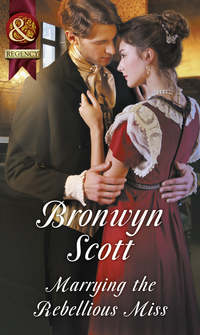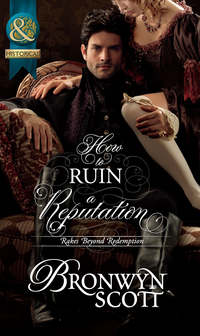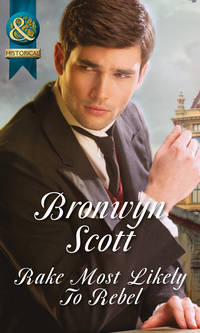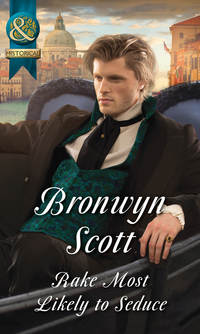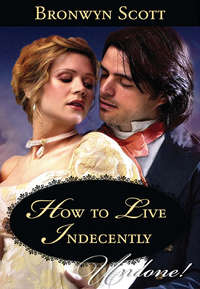
Полная версия
Tempted By His Secret Cinderella

He’s falling for a princess...
But she’s a commoner!
An Allied at the Altar story. A wild scheme to secure a patron for her father’s play finds Elidh Easton at a house party dressed as Italian royalty! But Elidh catches the eye of their dashing host, Sutton Keynes, who has four weeks to find a noble bride. He’d never look twice at her normally—poor, plain and untitled—but in the moment, it’s easy to imagine they have a future!
BRONWYN SCOTT is a communications instructor at Pierce College in the United States, and the proud mother of three wonderful children—one boy and two girls. When she’s not teaching or writing she enjoys playing the piano, travelling—especially to Florence, Italy—and studying history and foreign languages. Readers can stay in touch on Bronwyn’s website, bronwynnscott.com, or at her blog, bronwynswriting.blogspot.com. She loves to hear from readers.
Also by Bronwyn Scott
Russian Royals of Kuban miniseries
Compromised by the Prince’s Touch
inInnocent in the Prince’s Bed
Awakened by the Prince’s Passion
Seduced by the Prince’s Kiss
Allied at the Altar miniseries
A Marriage Deal with the Viscount
One Night with the Major
Tempted by His Secret Cinderella
Look for the last book,
coming soon
Discover more at millsandboon.co.uk.
Tempted by His Secret Cinderella
Bronwyn Scott

www.millsandboon.co.uk
ISBN: 978-1-474-08908-1
TEMPTED BY HIS SECRET CINDERELLA
© 2019 Nikki Poppen
Published in Great Britain 2019
by Mills & Boon, an imprint of HarperCollinsPublishers 1 London Bridge Street, London, SE1 9GF
All rights reserved including the right of reproduction in whole or in part in any form. This edition is published by arrangement with Harlequin Books S.A.
This is a work of fiction. Names, characters, places, locations and incidents are purely fictional and bear no relationship to any real life individuals, living or dead, or to any actual places, business establishments, locations, events or incidents. Any resemblance is entirely coincidental.
By payment of the required fees, you are granted the non-exclusive, non-transferable right and licence to download and install this e-book on your personal computer, tablet computer, smart phone or other electronic reading device only (each a “Licensed Device”) and to access, display and read the text of this e-book on-screen on your Licensed Device. Except to the extent any of these acts shall be permitted pursuant to any mandatory provision of applicable law but no further, no part of this e-book or its text or images may be reproduced, transmitted, distributed, translated, converted or adapted for use on another file format, communicated to the public, downloaded, decompiled, reverse engineered, or stored in or introduced into any information storage and retrieval system, in any form or by any means, whether electronic or mechanical, now known or hereinafter invented, without the express written permission of publisher.
® and ™ are trademarks owned and used by the trademark owner and/or its licensee. Trademarks marked with ® are registered with the United Kingdom Patent Office and/or the Office for Harmonisation in the Internal Market and in other countries.
www.millsandboon.co.uk
For Brony, who always has the best ideas
when I get stuck.
For Catie, who rescues anything on four legs.
And for Rowan, my very own philosopher king,
who contemplates the big questions.
A piece of each of you is in this story.
Contents
Cover
Back Cover Text
About the Author
Booklist
Title Page
Copyright
Dedication
Chapter One
Chapter Two
Chapter Three
Chapter Four
Chapter Five
Chapter Six
Chapter Seven
Chapter Eight
Chapter Nine
Chapter Ten
Chapter Eleven
Chapter Twelve
Chapter Thirteen
Chapter Fourteen
Chapter Fifteen
Chapter Sixteen
Chapter Seventeen
Chapter Eighteen
Chapter Nineteen
Chapter Twenty
Chapter Twenty-One
Chapter Twenty-Two
Chapter Twenty-Three
Epilogue
Extract
About the Publisher
Chapter One
London—Friday, July 13th, 1855
Sutton Keynes considered himself a man of science, for whom all occurrences had a logical reason. There was little room in his well-ordered life for superstition. And what room did exist for such a novelty was quickly being filled to capacity as his uncle’s ancient fossil of a solicitor, one Mr Barnes Esquire, leaned forward, joints creaking from the effort, and uttered thirteen of the unluckiest words ever spoken in succession to a bachelor who was quite happy with his single state.
‘You have four weeks to wed if you want to claim the fortune.’
Four weeks to wed.
The words seemed to suck the very air out of the cramped little office in Poppins Court. Damn it all to hell. He thought he’d headed off such madness when he’d visited his uncle this spring. He’d made it very plain he didn’t want his uncle’s money. He’d even gone as far as to suggest that if his uncle wanted to keep the money out of his own son’s hands he should tie it up in charitable annuities. His uncle had given it to him anyway. Sutton had not been nearly as persuasive as he’d thought.
Sutton reached for his teacup, wishing it held something stronger, and took a long swallow. He tried to appear neutral, as if his world hadn’t just been upended. He was a man of reason. He should stay calm until he had all the details. Perhaps the pronouncement only seemed dire on the surface.
‘Four weeks? That seems an exceptionally short amount of time in which to find a wife.’ A partner for life. It was an enormous commitment, one he’d managed to put off because of its enormity, until now. These things, like any decently run experiment, could not be rushed. There would be specimens to collect, variables to account for, observations to make, information to collect and analyse, hypotheses to test and eliminate as he winnowed down the field. ‘It would take at least a year to find a suitable bride.’ Sutton put his cup down and Mr Barnes quickly refilled it, perhaps hoping to make up in quantity of drink what the tea lacked in quality—mainly that it wasn’t brandy. ‘Is there any significance to that deadline?’ Sutton asked with a demeanour of equanimity, not wanting to give away his hand. He wasn’t opposed to marriage, in theory, but he was opposed to undue haste. Haste increased one’s margin for error exponentially. Surely he could argue for an extension unless there was a predetermined reason for such immediate action.
His mind was already searching for a rationale behind his uncle’s decision. His uncle liked to play with numerology among his many eccentricities. Four—the four archangels, the four gospels, the four sides of New Jerusalem in Revelation. Those things would appeal to his uncle, but Sutton couldn’t see any relevance to this situation. Four, of which the square root was two, his scientific mind put forward. The four elements, the four phases of the moon, the four seasons, the four divisions of the day.
‘It’s the bank’s provision, Mr Keynes,’ Barnes explained. ‘The bank your uncle’s funds are invested with requires that all accounts be resolved within four weeks of the account holder’s death.’ But the rest of it, the marriage condition, was all his uncle’s. In order to be a legitimate beneficiary of those funds, his uncle, not the bank, required him to be married first. It made sense now. Four. The square of two. Husband and wife. Completion. Two parts of a whole.
‘And if I refuse to follow my uncle’s dictates?’ He watched Barnes’s bushy grey eyebrows go up. It wasn’t every day a man considered turning away a fortune handed to him.
‘Then the fortune reverts to your cousin, Baxter Keynes.’ Mr Barnes peered over his thick-rimmed glasses meaningfully.
‘Of course. Bax.’ Sutton gave a derisive chuckle. Bax was the one factor that could compel him to take up his uncle’s challenge. There was much he would do to keep that amount of money out of Bax’s control. What an unreasonable game this was becoming. He wasn’t only being forced to marry, he was being forced to step into the metaphoric ring and compete against his cousin, his uncle’s only child. ‘Are you acquainted with my cousin, Mr Barnes?’
Barnes fixed Sutton with a strong stare. ‘Yes, indeed I am, Mr Keynes. He was here this morning, in fact. He didn’t stay long enough to have tea.’ The man’s tone was sharp, his gaze intuitive. For the first time since Sutton had entered the dingy office, the solicitor appeared to be more intelligent, more sane than Sutton had given him credit for. Most sane people struggled to do business with his uncle.
Baxter knew, then. That would make things interesting in a dangerous sort of way. Sutton picked up his tea and pondered that piece of information. ‘Angry, was he?’ His cousin had been left with nothing, although it couldn’t have come as a surprise. Sutton’s uncle had been threatening for years to pull something of this nature. The old man’s title wasn’t hereditary. The only thing he could leave Bax was his fortune and he hadn’t. Instead, he’d left it to his nephew.
‘Positively furious.’ Barnes grimaced, nodding towards the cracked window pane.
Sutton offered a tight smile. ‘If you’ve met him, you know there’s not a choice. It’s not a question of if I want to claim the fortune. I must. Baxter is not the sort of man to whom a fortune of that magnitude can be entrusted.’ His cousin wasn’t just reckless, spending money frivolously, although some of the fortune would indeed be squandered on harmless pursuits. Bax liked a good silk waistcoat and a fast horse as much as the next man. It wasn’t the harmless pursuits Sutton was worried about. It was the more harmful ones; Bax was mixed up with slavers, the type that sold white women into the harems of the east in order to gain the favour of the Ottoman pashas, and arms dealers who sold guns for profit regardless of the cause, regardless of the side. In short, Bax played a deep game with powerful men. His involvement, of course, was most certainly not well known. For all intents and purposes, Bax, son of the eccentric Sir Leland, was a typical gentleman. But only on the surface. Beneath that surface, Bax inhabited a dark, dangerous world.
Barnes’s old eyes sharpened for a moment over the rims of his glasses. ‘We see each other plain, Mr Keynes. I assume you’ll be marrying shortly, then.’ It was not a question. Barnes tapped his papers into place and reached for another set of documents.
‘I suppose I shall be.’ Shortly. Quickly. Without the study necessary to make a quality decision. It was antithetical to his nature. Anabeth Morely had taught him that in his youth. He’d jumped into love with her head first only to find shallow water and grave disappointment. He’d not ventured forth since.
As a result, marriage was the last thing on his mind, right there at the bottom of the list of his priorities including his uncle’s fortune. Whenever he thought about marriage, and that was hardly often enough to even qualify as seldom, it was as an amorphous something to pursue in a nebulous future, perhaps five years from now, once his camel dairy was firmly established in Newmarket. But not this summer. The summer was half over. He had his prized mare due to foal next month, he had next year’s breeding programme to look over, bloodlines to study, the camel’s milk studies to continue. The Newmarket Breeders Club would be expecting his report on the subject at the September meeting. He absolutely could not get married this year, not when there was so much to do.
It was bad enough his uncle’s death had pulled him away from Newmarket this week. He’d be there now if it wasn’t for the details of his uncle’s will to sort through. In fact, he’d thought to leave for home as soon as the will was read, but today’s revelations had put paid to that. Signing papers and looking over deeds would keep him in town another few days.
He far preferred the clean, straightforward living of Newmarket to the bustle and social politics of the London Season. He far preferred his animals to the matchmaking biddies of the ton and their feather-headed daughters. Some might consider him reclusive. They wouldn’t be far wrong. He liked to think of himself as ‘selective in his attentions’. He simply didn’t have time for nonsense and London was notoriously full of it. He’d had plenty of its shenanigans when he’d first come up to town.
Now, however, his uncle’s will threatened all that selective attention on a more permanent level. It didn’t need to, though. Surely if there wasn’t a way around the will, there was a way through it. His logical, scientist’s mind turned itself to his options. He could make his marriage a temporary arrangement. Once the will was satisfied and the fortune was out of Bax’s hands, they could separate.
‘Ahem, Mr Keynes, are you listening?’ No. He wasn’t, in fact. He was too busy looking for loopholes. ‘There are conditions attached to your marriage.’ The solicitor raised his bushy brows again. ‘I would listen closely if I were you. No sense in sacrificing oneself in marriage just to get it wrong.’ Barnes had his attention now and he knew it. The old man smiled in satisfaction. ‘If I may continue?’ He cleared his throat. ‘First, the bride must be from a noble family. Second, the marriage must last. It cannot be annulled or divorced or discontinued in any manner or the fortune is forfeit.’
Damn. Sutton had been counting on that—bear out the marriage for a couple of years and then cut his wife loose. Surely he could find a woman who would agree to those terms if she was handsomely paid. Sutton rethought his options. If divorce was out of the question, there was still a chance at informal separation, an ‘open’ marriage, as distasteful as the idea was to him. He had expectations, after all, loyalty and fidelity being two of them. His uncle’s mandate, however, was playing havoc with those ideas along with everything else.
Sutton had no sooner contemplated the idea of the open marriage than the solicitor continued. ‘Third, no separate lives, which means no separate residences and you may spend no more than a third of the year apart.’ Well, so much for the wiggle room. That took care of it. The noose was tightening.
Sutton shifted in the hard wood chair and crossed a leg over his knee. His blasted teacup was empty again. ‘It seems that I am well and truly roped into this, then.’
‘Some would say you are well compensated for your sacrifice. All men marry in the end anyway,’ the solicitor offered in an attempt to soften the blow.
‘It’s not the marriage I mind. It’s the haste with which it must be done and the parameters placed on who it must be in order to claim a prize, a fortune I don’t want except that it must not go to Bax. I have wealth of my own,’ Sutton replied drily. That was the complete irony of the situation. His uncle had given a wealthy man a fortune, knowing full well the fortune itself held no allure. ‘My uncle is blackmailing me from beyond the grave.’ The dead bastard was getting everything he wanted: his fortune protected from his unscrupulous son and his nephew wed, the best his uncle could do to ensure the Keynes line continued, having all but officially disinherited Bax.
‘I can’t possibly consider refusing, for the greater good, as I am sure you know.’ He couldn’t possibly consider failing either. His canny uncle hadn’t only made an ultimatum regarding his fortune, he’d made a game of it, one that pitted cousin against cousin. Bax would get the fortune if Sutton failed. Bax wouldn’t sit idly by and leave the outcome of that game to chance. He would meddle and he would be dangerous, not only to Sutton but to whomever Sutton targeted as a bride. Bax would stop at nothing to prevent him from fulfilling the conditions of the will.
Barnes poured a third cup of tea. Sutton picked it up and drank it down reflexively, his mind moving on to other issues like the pressing matter of a bride. It was one thing for him to marry in four weeks. He had a motive. But what bride of noble birth would marry him under such short notice? And the notice would only get shorter with every day that passed. Where was he going to find a bride in time? Especially one he could live with for the rest of his life?
The scientist in him shuddered to think at the flaws in collecting an adequate sample to base his decision on. The Season was more than halfway gone, but his bride would have to come from whoever was on hand in London and unclaimed at this point. He wondered if his uncle had thought about that? He supposed it could have been worse. His uncle could have died the end of August with Parliament out and everyone already absconded to their country homes. Where would he have found a bride then?
Barnes collected the pile of documents, making signs of dismissing him. But Sutton wasn’t ready to leave yet. ‘What about those papers? We haven’t talked about everything in them yet.’
‘And we won’t until you have your bride,’ Barnes said sternly, not appreciating the affront to his competence, as if he’d left something undone. ‘Your uncle has left instructions to be read upon the announcement of your engagement. Then, and only then, shall we proceed. He was very thorough, Mr Keynes. As for you, there is a lot to think about, and do, if you choose, in a very limited amount of time. Please let me know if I can be of assistance.’ It was about as blatant a dismissal as they came. The implication was clear: the clock was already ticking. The old man might as well have turned over an hourglass and started counting down the minutes towards four weeks.
‘Thank you, I appreciate your time today, Mr Barnes.’ Sutton rose and extended his hand. ‘We will be in touch.’
Outside, the sun was still high, it was still July in the city, and it was still hot. Sutton ran a finger around the inside of his collar. It seemed unfair the world had not changed in the hour he’d spent in the solicitor’s office. His life had changed. Shouldn’t the world have changed as well? Sutton headed towards Ludgate Circus, pausing at the public urinals to relieve himself before he caught a hansom cab to Mayfair. Too much damn tea. Too much to think about, all of it circling back to focus on one critical issue: a bride. Without a bride, it wouldn’t matter how willing he was to make the sacrifice.
Perhaps that was what he hated most about the whole arrangement. It required him to rely on someone beyond himself. It was not something he did easily or often, even with friends. To do so now with a woman he didn’t know was preposterous. He liked to be the one who controlled the variables of any given experiment. Now, the critical variable was beyond him. Everything hinged on her, whoever she might be.
Sutton shook his head. No. He would not be the victim here. He would not focus on what he didn’t control, but on what he did. He might not know a woman to marry, but he did know a woman who could help him: his mother. Before he could approach her, however, he needed a moment or two to think. He had the cab stop and let him out a few streets before he reached South Audley Street. By the time he reached number 71A a plan was forming. He would solve this situation as he solved every other puzzle placed before him—with logic and reason.
Chapter Two
‘This is the most ridiculous, most scandalous thing your uncle has ever done. Wherever will you find a bride in four weeks and at the back end of the Season? People are thinking of leaving London, not lingering.’ Catherine Keynes gave voice to the very thoughts that had plagued him from the ice-blue sofa in the drawing room where her at-home had just concluded.
‘Those were my thoughts, exactly.’ Sutton gave a wry chuckle. ‘But you look well, Mother. Between the two of us, I am sure we’re up to the task. I have a plan, but I will need an able assistant.’ He studied his mother—a strong, shrewd woman who loved her family fiercely, if not maternally. He’d always thought, growing up, that she would have made a formidable queen in bygone years. He could imagine her navigating the dangerous intricacies of medieval court politics. His mother was the ablest person he knew for what he intended. Well connected, well experienced in society after thirty-two years among its ranks.
‘I should have known you’d have a strategy.’ She sighed. ‘I don’t suppose that strategy involves walking away from the fortune. You don’t need it and I don’t need it, in case you were thinking of taking it for my sake. I am comfortable enough with what your father left me. Who knows? I might even remarry at some point should the right man present himself, then you wouldn’t need to worry over me at all.’ It was a distinct possibility. His mother was still a handsome woman at fifty. This afternoon, she was dressed in a blue-and-silver gown of summer cotton that matched the drawing room decor, her still-dark honey hair coiffed in an intricate collection of braids. Her posture straight.
Sutton stopped pacing and leaned against the white Carrara marble mantel, imported from Italy and expensive, a further reminder that the Keyneses didn’t need the money. They lived well enough on their own, Sutton’s own father having made a fortune in the south-east Asian trade. Sutton shook his head. ‘You know I can’t just turn that money over to Bax.’
‘It’s not your job to save the world from him,’ his mother argued the temptation that had crossed his mind in Barnes’s office. He could walk away and it certainly made things easier. He could forgo a hasty, dramatic bridal search and retreat to the comfort of life as he knew it. But that was neither socially responsible, nor was it the honourable thing to do.
‘“All it takes for evil to prosper is for good men to do nothing,”’ he quoted. ‘I have to do my part.’ Sutton paced the length of his mother’s drawing room, pushing a hand through his thick hair. He blew out a breath. ‘The last girl Bax “importuned” killed herself last week. She washed up on the shores of the Thames with stones in her pockets.’
‘Good lord.’ His mother blanched. ‘Will no one stop him?’
‘He’s too powerful. He owns too many secrets. But we can mitigate him and, in time, I can work against him and others like him. He’s not alone in his corruption or his brand of it. For now, I can rob him of excess funds.’
‘By making a scandal of a marriage?’ his mother scolded, a furrow creasing her brow. ‘A race to the altar can be nothing less than a spectacle.’
‘Certainly it can’t be less than a spectacle, but it can be more.’ That was the plan anyway.



